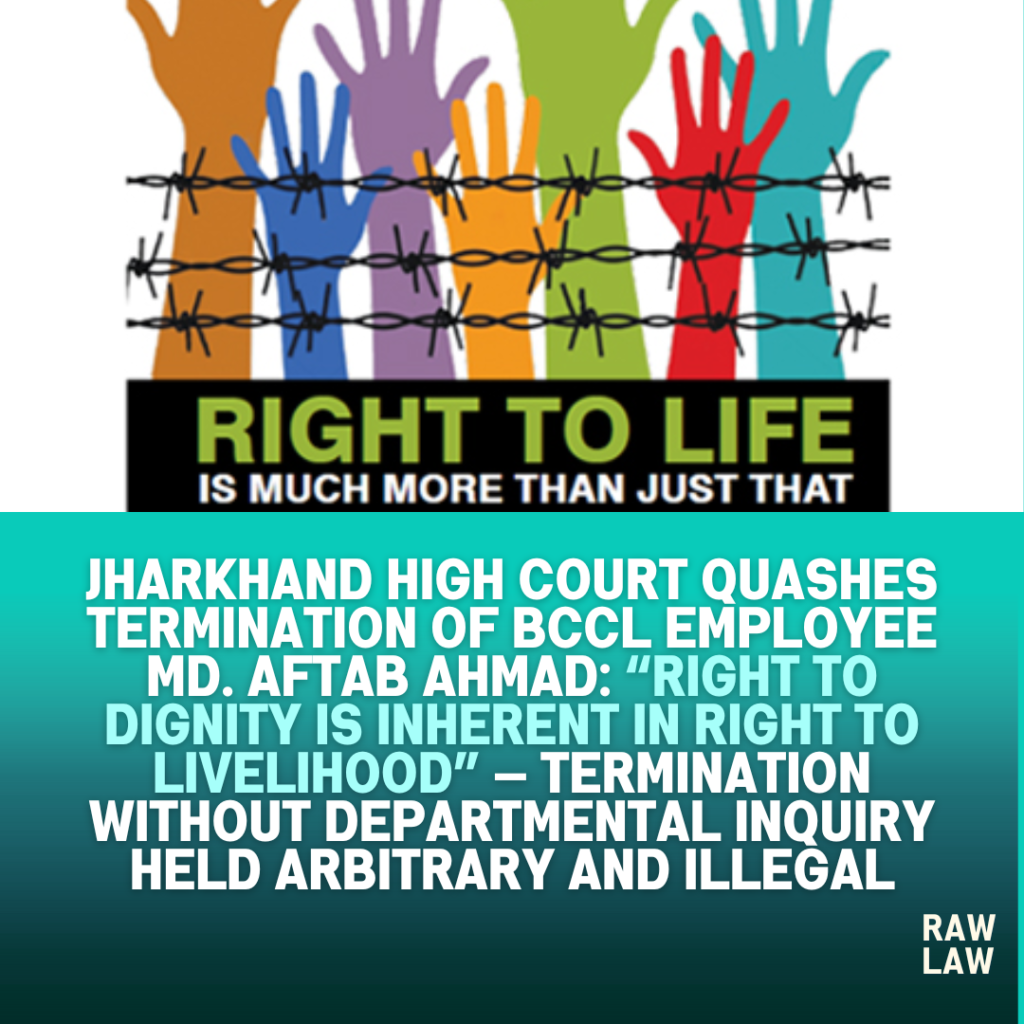Judgment Name: Md. Aftab Ahmad v. Bharat Coking Coal Limited & Ors.
Date of Judgment: 17 June 2024
Coram: Justice Deepak Roshan
Court: High Court of Jharkhand, Ranchi Bench
Court’s Decision
The Jharkhand High Court allowed the writ petition filed by Md. Aftab Ahmad challenging his termination from Bharat Coking Coal Limited (BCCL) on the ground that it was passed without holding any departmental enquiry. The Court held the termination to be violative of Articles 14 and 21 of the Constitution, set aside the dismissal order, and directed BCCL to reinstate the petitioner in service. The Court also clarified that it had not considered the merits of the allegations but was intervening solely due to the procedural illegality and denial of natural justice.
Facts
Md. Aftab Ahmad, a coal tippler operator in BCCL, was accused of participating in an illegal dharna on 14.06.2022 and assaulting an Area Manager and Project Officer. An FIR was registered, and a charge sheet was submitted under Sections 147, 341, 323, and 353 of the IPC. BCCL placed the petitioner under suspension and, subsequently, terminated his services by an order dated 10.11.2022, without conducting a domestic enquiry or issuing a second show-cause notice.
The petitioner contended that despite repeated representations, he was neither given an opportunity of hearing nor served with any enquiry report.
Issues
- Whether the termination of the petitioner without a departmental enquiry was valid?
- Whether such termination violated principles of natural justice and constitutional protections under Article 21?
Petitioner’s Arguments
The petitioner contended that:
- He was dismissed without holding any departmental enquiry, which is mandatorily required under Clause 29.2 of the Certified Standing Orders of BCCL.
- There was no second show-cause notice or copy of the enquiry report provided to him.
- The entire process was conducted behind his back, violating natural justice.
- The disciplinary authority did not record any finding of guilt on its own and relied solely on the FIR.
- He was deprived of his right to livelihood without due process.
Respondents’ Arguments
BCCL defended its action by stating:
- The termination was justified based on the seriousness of the misconduct, including physical assault and obstruction of duty.
- The charge sheet in the criminal case substantiated the allegations.
- It was not feasible to hold an enquiry due to the nature of allegations, which involved multiple employees and had criminal implications.
- The disciplinary authority had sufficient material to form an opinion without formal enquiry.
Analysis of the Law
The Court relied heavily on the Certified Standing Orders of BCCL, particularly Clause 29.2, which mandates a domestic enquiry before imposing major penalties like dismissal. The Court emphasized the constitutional requirement under Article 21, holding that:
“Right to livelihood is an integral part of right to life and it cannot be taken away without following due procedure.”
It further noted that the principles of natural justice are not empty formalities, and even if allegations are serious, due process must be followed.
Precedent Analysis
- D.K. Yadav v. J.M.A. Industries Ltd., (1993) 3 SCC 259
- Held that right to livelihood is a component of Article 21, and termination without hearing is illegal.
- Held that right to livelihood is a component of Article 21, and termination without hearing is illegal.
- State of Uttar Pradesh v. Shatrughan Lal, (1998) 6 SCC 651
- Confirmed that failure to hold enquiry renders dismissal illegal, even if misconduct is alleged.
- Confirmed that failure to hold enquiry renders dismissal illegal, even if misconduct is alleged.
- M.C. Mehta v. Union of India, (1999) 6 SCC 237
- Cited to reinforce the broad scope of right to life and dignity under Article 21.
- Cited to reinforce the broad scope of right to life and dignity under Article 21.
The Court followed these judgments to hold that the failure to follow due procedure made the dismissal unsustainable.
Court’s Reasoning
Justice Deepak Roshan held:
“This Court is of the opinion that the petitioner has been deprived of his right to livelihood in the most arbitrary manner without following the due procedure established by law.”
He emphasized that even if criminal charges were pending, disciplinary action had to be independent and compliant with internal rules. The Court noted that the petitioner’s suspension could not be directly converted into dismissal without affording him a reasonable opportunity.
Conclusion
The Court:
- Set aside the dismissal order dated 10.11.2022.
- Directed reinstatement of the petitioner in service.
- Held that merits of the allegations were not adjudicated, and the issue was confined to procedural fairness.
- Reserved liberty to the employer to take fresh disciplinary action after following due process.
Implications
- The ruling reinforces the principle that public sector employers must follow statutory and contractual obligations before dismissing employees.
- Dismissal based solely on pending criminal charges, without departmental enquiry, is legally unsustainable.
- The judgment strengthens judicial protection of employment rights under Article 21, especially in PSU contexts.
Judgments Referred & Their Role
- D.K. Yadav v. J.M.A. Industries (1993) – Right to livelihood under Article 21; termination without hearing is void.
- State of U.P. v. Shatrughan Lal (1998) – Dismissal without enquiry invalid, even if misconduct is serious.
- M.C. Mehta v. Union of India (1999) – Right to dignity and life under Article 21 must be protected even in employment matters.



